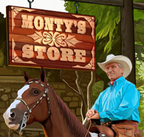This post is a quote of an article at TheHorse.com. I think it ties in nicely with what Monty says about creating a place where the student can learn. Nice to see that more and more is confirmed by scientific studies. :)
[quote]
Horses Associate Places With Positive, Negative Experiences
Researchers determined that, even in a short time span, a horse can associate a place with positive or negative experiences and consequently present different emotions when he returns to that place.
Your horse doesn’t want to go in that set of crossties. He gets all stressed, kind of flips out. But it’s just somewhere to stand, like any other set of crossties. Right?
Then you remember: That was the bay you always held him in when it was time for the veterinarian to debride a slow-healing wound. Is it possible your horse has associated that one particular place with a bad event and negative emotions? Absolutely, French scientists said.
It’s also likely your horse associates certain places with good events and good emotions. And what’s more, those associations can directly affect horses’ learning.
“Within a very short amount of time, a horse can associate a place with an experience that he’s had (feeding, or by contrast, even slight stresses) and consequently present different emotions when he comes back to that place,” said Léa Lansade, PhD, of the French Horse and Riding Institute and the National Institute for Agricultural Research’s behavior science department, in Tours.
“That emotional state will then play a role in the way he learns later,” she continued. “And these are factors that we need to take into consideration when we’re training horses.”
In other words, when you’re training your horse, you can’t just assume that the place where you’re training has no effect, Lansade said. On the contrary, the impact could be significant.
“It’s important to keep in mind that each event a horse has experienced in a particular place leaves traces that last much longer than we might think,” she said. “So later, when we work the horses in that place, that will have an impact on the way he learns. If in that place, he experienced more positive events, he’ll have a more flexible and shapeable behavior that better adapts to what we’re asking of him. But on the other hand, if he’s had rather unpleasant or even stressful experiences in that place, he could be more rigid in his training and less capable of adapting to the task.”
Lansade and her fellow researchers tested the cognitive flexibility—the ability to adapt learning to new and changing situations—in 55 mares via a series of steps:
- They tested each mare’s personality.
- They let all the mares experience negative, positive, or neutral events in specific box stalls that were easy to distinguish from other stalls (by the sights or sounds in each stall):
- The negative experience would be water suddenly shooting into the stall, a ball suddenly thrown into the stall, loud noises suddenly played, or a tarp being shaken out just in front of the stall.
- The positive experience would be food distribution.
- The neutral experience would be nothing in particular happening at all.
- Then, they separated the mares into three groups: negative experience, positive experience, and neutral experience. They had each group of mares return to the stall associated with that experience, where they would undergo a new learning session. But this time, the horses waited in the stall without any positive or negative experiences happening.
- In the new learning session, they taught each mare to find hidden food under the traffic cone that a handler pointed to.
- In the “extinction” phase of the learning, they then removed the hidden food and observed how many times the mare would keep touching the right cone even when the food was gone.
They found that all the horses learned to touch the “right” cone at about the same speed, Lansade said. (It’s possible that they would have noticed
learning “acquisition” differences in the groups if the negative experience had been more stressful, she added. But their study only used slight stressors which did not appear to affect initial learning of a task.)
However, the found that the horses in the positive experience group stopped picking cones much faster than the other groups when the food disappeared. They were faster to accept that the situation had changed, and that there was no reason to keep picking cones if there was nothing to gain from it.
By contrast, the horses that were trained in a stall where they’d had a negative experience were more likely to keep choosing the cone that the handler indicated, Lansade said. And that was especially true for the horses with the most
fearful personalities, who just tended to keep going and going without extinguishing what they’d learned.
“The horses that learned in an environment where they’d had previous positive experiences were more flexible—meaning they were more capable of adapting their behavior to the situation,” she said. “They were more malleable, so to speak, and faster to understand the stakes involved in the situation and thereby adapted to the situation more quickly. As for the horses who learned in an environment where they’d had more stressful experiences, though, they had a more rigid behavior, seeming more ‘stubborn’ and ‘automatic.’”
Further studies could lead to more concrete training recommendations, Lansade said. In the meantime, people should keep in mind that, for better welfare and training results, it’s better to train horses in places that they associate with positive experiences.





https://thehorse.com/159588/horses-associate-places-with-positive-negative-experiences/
Double oops about the pic! I forgot to delete it before posting. If it takes up too much space I hope an admin can go in and delete it for me.
Fascinating! Thank you for posting. I will see if I can delete the photo and not the post, but not sure.
So much to learn and verify. We have an interesting story shaping up in Australia of a race horse who has stopped breaking from the gate. Misunderstood, I'd say. More soon...
Debbie